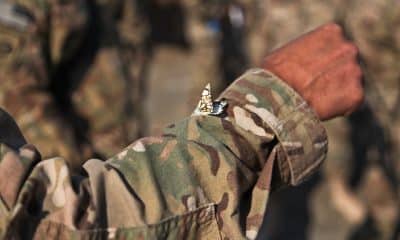News
Phones, Islamic Books And Currency Exchange. Some Businesses Are Making Money Out Of Taliban Rule

KABUL, Afghanistan Taliban – Yunis Safi, a Kabul businessman, understands how important it is to show off your phone if you want something done.
“In Afghanistan, your phone is your personality,” he remarked, beaming, his hands adorned with jewel-encrusted rings. One has an emerald, the other a large Russian diamond. “When you go to a meeting with the government, the better your phone, the more they respect you.”
Safi owns a phone business in the exclusive Shar-e-Naw area. An armed guard stands outside. The iPhone 15 Pro Max is now on store shelves, priced at $1,400. He has customers willing to part with this amount of money, which may surprise some, considering the country’s economic troubles and that more than half of the population relies on humanitarian help for survival.
Afghanistan’s finances were precarious even before the Taliban took power in 2021. The budget relied significantly on foreign help, and corruption was rampant. The seizure shattered Afghanistan’s economy, freezing billions of dollars in international finances and forcing tens of thousands of highly skilled Afghans to flee the country with their money.
AP – VOR News Image
Phones, Islamic Books And Currency Exchange. Some Businesses Are Making Money Out Of Taliban Rule
Despite the terrible conditions, some businesses benefit under the Taliban administration. Women are relegated to customers, however, because authorities have forbidden them from most jobs, including retail. None of Safi’s 78 employees are female.
He has tapped into a varied client base, including those eager for the latest iPhone release and those who prefer simple devices. The latter account for the majority of his sales and range in price from $20 to $200.
The Taliban used to target phone towers and threaten telecom companies, accusing them of working with the United States and other international forces to detect insurgent movements via mobile phone signals. Now, they’re investing in 4G mobile networks.
The Communications Ministry reports that 2 million new SIM cards have been issued in the last two years, and subscriber numbers are increasing. Enayatullah Alokozai, a ministry official, stated that the government is investing $100 million in telecom and has completely rebuilt hundreds of towers.
There are 22.7 million active SIM cards in a country with a population of 41 million. Ten million are for phone calls, with the remainder for mobile internet.
According to Trade Ministry estimates, phone imports have increased. More than 1,584 tons of phones entered Afghanistan in 2022. Last year, it weighed 1,895 tons.
Safi said he had many Taliban customers, and the younger ones prefer iPhones. “Of course, they need smartphones. They use social media and enjoy making videos. The iPhone offers stronger security than Samsung. The camera’s resolution, CPU, and memory are all improved. Afghans use smartphones like everyone else.”
Safi has the iPhone 15 Pro Max, an Apple Watch Ultra, and three automobiles.
Business was difficult shortly after the Taliban took power, but it is improving, according to Safi. “The people buying the new release iPhones are the ones with relatives abroad sending money to Afghanistan.”
AP – VOR News Image
Phones, Islamic Books And Currency Exchange. Some Businesses Are Making Money Out Of Taliban Rule
Remittances are a lifeline, but less than half of what they were before the Taliban took power and the financial system collapsed.
At Kabul’s rowdy Shahzada Market, hundreds of money changers clutch stacks of the local currency, the Afghani, and noisily hawk their wares. They occupy every floor, stairwell, corner, and cranny.
According to Abdul Rahman Zirak, a senior official at the money exchange market, $10 million changes hands every day. The diaspora sends largely U.S. cash to family, which they convert for Afghani.
Before the Taliban took control, there were more ways to donate money to Afghanistan. However, there are no longer any linkages to SWIFT or international banking, which is one of the main reasons why business is brisk in the market, he said.
“The work of money exchangers has increased and strengthened,” he stated. “Money transfers come from Canada, the U.S., Europe, Australia, Arab nations and other neighboring countries.”
Trade becomes extremely chaotic during the holidays. During the holy month of Ramadan, 20,000 people visited the market daily, and it took more than 90 minutes to enter, he claimed.
Our business may suffer if the restrictions are lifted and the assets are unfrozen. But I don’t see this happening. Many do not have bank accounts. Unemployment is rising, therefore people send money to Afghanistan. Our company will be needed for years to come.”
Irfanullah Arif, who owns Haqqani Books, a specialist retailer of Islamic manuscripts, is likewise pleased with his fortunes. His consumers are primarily religious school professors and pupils.
There are at least 20,000 madrasas in Afghanistan. The Taliban intends to build more. Last year, the supreme commander allegedly directed the recruiting of 100,000 madrassa teachers.
AP – VOR News Image
Phones, Islamic Books And Currency Exchange. Some Businesses Are Making Money Out Of Taliban Rule
While Arif’s business suffered, along with everyone else’s, from the chaos that followed the takeover, there was another cause. “All the students left the madrassas and went to work for the (Taliban) government,” Arif claimed.
Success, however, comes with a price. Arif imports everything, and the Taliban are just concerned with collecting revenue, even from Islamic literature.
Arif pays a tax of 170 Afghanis ($2.36) for a carton of 100 books, with a shipping cost of 500 Afghanis ($6.95). His bookstore’s taxes have increased under the Taliban administration.
“That’s why books are expensive in Afghanistan,” he sighed. “With the increase of madrassas, our trade has gone up, but so have the taxes.”
SOURCE – (AP)





































